The Black community in the United States is facing unique challenges during the current fentanyl epidemic, including barriers to treatment.
The COVID-19 pandemic may seem like just a distant memory now, but it changed everyone’s lives around the world. In America, some communities are still experiencing the devastating impact of increased opioid overdose deaths along with the virus.
People have long seen the face of addiction in the opioid epidemic as a concern primarily among white, rural populations. However, the demographics are quickly changing. Opioid use among Black communities has soared over the past few years, especially during the pandemic. With fentanyl now flooding the streets, it has created a perfect storm of destruction in communities with limited resources to handle opioid addiction.

Alarming Opioid Overdose Rates in Black Communities
The issues facing Black communities in regard to drugs and addiction, unfortunately, aren’t new. In previous decades, the war on drugs left many communities of color with high incarceration rates for drug offenses and without vital access to treatment. Similar issues face these communities today as the fast-growing pace of synthetic opioid deaths affects Black Americans across the country.
The U.S. Department of Health and Human Services published a report in February 2020. It showed that Black Americans experienced the most severe uptick in synthetic opioid overdose rates in the country, with fentanyl responsible for about 60 percent. Between November 2019 and 2020, America experienced more than 92,000 overdose deaths. Over 50 percent of these emergency calls nationwide were for Black community members.
Historically, the Black population received far fewer opioid prescriptions during the opioid crisis. However, the recent influx of fentanyl on the streets has made synthetic opioids a dire issue for all races, with the most alarming escalation among Black Americans.

Barriers to Treatment for Opioid Use Among Black Communities
Various formats of opioid addiction treatment exist, ranging from inpatient to outpatient medication-assisted treatment. However, not all communities in need receive equal service. The most effective and practical methods involve methadone clinics, which require patients to visit six times a week. Alternatively, office-based opioid treatment uses prescribed buprenorphine medication that patients can take home to self-dispense.
Studies show that geographic access to medication-assisted treatment (MAT) is lacking in Black and Hispanic neighborhoods. Service providers are twice as likely to be found in whiter areas compared to other communities. While opioid addiction has historically been a concern primarily affecting the white American population, current overdose rates reveal a different reality. This disparity is now harming individuals in need across all racial and ethnic backgrounds.
Still, data shows that Black patients are half as likely to receive follow-up treatment after a non-lethal overdose upon enrolling in treatment than white patients, leading to higher relapse rates. Lacking follow-up care causes many to remain unaware of their treatment options, forcing them sometimes to forego seeking help altogether.
Even with the Affordable Care Act’s addition of opioid addiction treatment coverage in 2014, the complex paperwork and hoops deter many patients. These challenges often lead them to give up on finding a clinic close to home that fits their plan.
Racial discrimination also plays a role in creating treatment barriers for Black Americans. Many provider policies, reflecting racial bias, reduce access to medications like buprenorphine because of unfounded fears of misuse or illicit sale.

Raising Awareness of Opioid Use Among Black Communities
Medical professionals working in Black communities, who are not personally involved with addiction treatment or specialized in it, often lack awareness. They may not realize how much medications like buprenorphine can help those struggling.
Spreading awareness among the medical community is vital for improving people’s chances of overcoming opioid addiction. This becomes increasingly important as cases continue to rise in marginalized communities.
Along with the medical field, members of the Black community still battle with stigma among drug users and their families. Addiction can be difficult to deal with, and those who need help aren’t always the easiest to communicate with while opioids take control of their thoughts and actions.
Raising awareness in the communities hardest affected can spark the change needed for everyone to see opioid use disorder as a chronic illness that can be helped with comprehensive medical treatment.
“Ours is not the struggle of one day, one week, or one year. Ours is not the struggle of one judicial appointment or presidential term. Ours is the struggle of a lifetime, or maybe even many lifetimes, and each one of us in every generation must do our part.”
— John Lewis
Medical Treatment for Opioid Use Among Black Communities
Opioid use disorder has become a more rampant issue among communities previously less affected by the heroin epidemic. In fact, this rise has led to common misconceptions surrounding treatment. Many still think that the only solution to getting medical care for addiction involves expensive rehabilitation retreats and inpatient care.
However, these options are often very cost-prohibitive and not as effective long-term as outpatient treatment with the use of medications. Those unaware of their outpatient options may attempt to overcome their addiction on their own, which carries a high risk of fatal and chronic relapse.
Improving awareness of office-based opioid treatment in Black communities affected by fentanyl will significantly help many people struggling. Educational materials that discuss the benefits of Suboxone and substance use counseling can also lessen the stigma surrounding addiction and asking for help.

Medication-Assisted Treatment Accessibility at AppleGate Recovery
AppleGate Recovery is dedicated to helping patients, regardless of race, religion, gender or creed, reach recovery from opioid use disorder. Our medical providers are certified and specialized in dealing with opioid addiction. Additionally, our knowledgeable staff can assist those interested with any paperwork or insurance questions they may have. Email, call or visit our judgment-free facilities today to learn more about our intake process and office-based opioid treatment programs.

Contact AppleGate Recovery Today
If opioid addiction is impacting your life or the life of someone you care about, reach out to our treatment center. We are here to provide the support and care you need to take the first step toward recovery.
Call 888.488.5337
